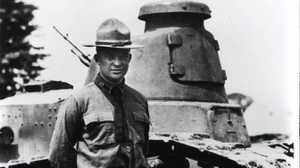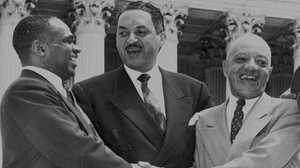Eisenhower and McCarthy

The end of World War II saw the United States defeating two enemies -- Germany and Japan -- and gaining a new one, the Soviet Union. The wartime alliance between the U.S. and the U.S.S.R. had proven to be a marriage of convenience. With the ink barely dry on the treaties ending the war, the two new dominant world powers found themselves locked in a battle over the course of postwar events. The Cold War had begun.
As the relationship between the U.S.S.R. and the U.S. deteriorated, the fear of a Red Menace gripped America. Such sentiments were eagerly exploited by politicians seeking to fan the flames of communist hysteria. Republican senator Joseph McCarthy was one such politician. McCarthy grabbed headlines in 1950 with his claim that he held a list of 205 State Department employees who were "known Communists." When pressed for details, he reduced the number of names on the list to 57, but still maintained his fiery demands for their expulsion.
Dwight Eisenhower found Joseph McCarthy's demagoguery reprehensible. As a military man he had been able to distance himself from petty political crusades in the name of the greater cause. But in 1952, as a first time candidate for the office of the presidency, he found it would be a good deal more difficult to maintain his political purity. When McCarthy delivered a blistering attack against former Secretary of State George C. Marshall, calling him "a man steeped in falsehood," candidate Eisenhower was faced with a dilemma. A popular member of his own party was publicly disparaging a man Ike considered a valued mentor. Eisenhower's personal and political instincts came into conflict during a campaign stop in McCarthy's home state of Wisconsin. Eisenhower was prepared to deliver a defense of Marshall, praising him "as a man and a soldier," and condemning the tactics of McCarthy as a "sobering lesson in the way freedom must not defend itself." But noble intentions gave way to political reality. Aware of McCarthy's huge base of support and not willing to risk losing votes in a crucial state, Eisenhower delivered his speech minus the defense of Marshall and the condemnation of McCarthy. It was a decision that would haunt him for the rest of his life.
McCarthy's influence did not abate after Ike had entered the White House. In an apparent effort to demonstrate that he, too, was tough on communists, Eisenhower supported legislation extending the reach of espionage and sabotage laws, and authorized the FBI to step up its efforts to infiltrate and disrupt Communist Party activities. Eisenhower refused to grant executive clemency to Julius and Ethel Rosenberg, who were convicted of spying for the Soviets, even though he admitted being "impressed with all the honest doubt" concerning the fairness of their trial. Ike allowed the execution to go forward in "the hope that it would deter others." But various news organizations, including the generally supportive Time magazine, criticized what they called the Eisenhower administration's "disgraceful episodes of appeasement" of McCarthy and his anti-communist crusade.
President Eisenhower defended his refusal to denounce McCarthy publicly, claiming that to do so would only further polarize the nation and reward McCarthy with additional publicity. To his aides, Eisenhower vowed, "I will not get into the gutter with this guy." By the end of 1953, polls indicated that at least half of all Americans had a favorable impression of McCarthy and his tactics. Emboldened by such support, McCarthy set out to widen the scope of his investigations. This time, however, he would go too far.
When McCarthy, armed with little more than hearsay and innuendo, set out to expose communists within the U.S. Army, Eisenhower decided enough was enough. He instructed his staff to present information that would discredit McCarthy. It was revealed that McCarthy had petitioned the Army to award preferential treatment to his assistant, David Shine. Finding himself on the defensive, McCarthy demanded notes of meetings between Eisenhower administration personnel and Army officials. Eisenhower established a presidential precedent by invoking executive privilege in refusing to turn over the notes. Claiming that matters of national security might be breached if administration officials were forced to testify under oath, Eisenhower robbed McCarthy of the opportunity to perpetuate his inquisition. From that point on the Army-McCarthy hearings degenerated into a series of increasingly unfounded and paranoid accusations.
Eisenhower quietly exerted pressure on Republican senators to go forward with a censure of McCarthy. In December 1954, the Wisconsin senator was condemned for conduct unbecoming a Senator. Eisenhower had been successful in undermining McCarthy by employing "hidden-hand" tactics, but critics contended that more decisive action could have prevented many innocent people from being forever tainted by groundless charges.







